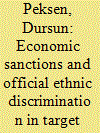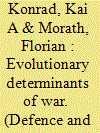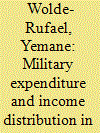| Srl | Item |
| 1 |
ID:
144789


|
|
|
|
|
| Summary/Abstract |
We model the perspective faced by nuclear powers involved in a supergame where nuclear deterrence is used to stabilise peace. This setting allows us to investigate the bearings of defensive weapons on the effectiveness of deterrence and peace stability, relying on one-shot optimal punishments. We find that the sustainability of peace is unaffected by defensive shields if the latter are symmetric across countries, while asymmetric endowments of such weapons have clear-cut destabilising consequences.
|
|
|
|
|
|
|
|
|
|
|
|
|
|
|
|
| 2 |
ID:
144786


|
|
|
|
|
| Summary/Abstract |
Conventional studies on the consequences of sanctions tend to focus on the target society as a whole without specifying how foreign economic pressures might affect the well-being of vulnerable groups within target countries – the same groups who often disproportionately bear the burden of sanctions. This study explores the extent to which sanctions increase the likelihood of discriminatory government practices against one of the globally most vulnerable groups, ethnic groups. It is argued that sanctions contribute to the rise of official ethnic-based economic and political discrimination through contracting the economy and creating incentives for the target government to employ ethnic-based discriminatory policies. Using data on over 900 ethnic groups from 1950 to 2003, the results lend support for the theoretical claim that sanctions prompt the government to pursue ethnic-based discriminatory economic and political practices in multiethnic countries. The findings also indicate that multilateral sanctions are likely to be more harmful to the well-being of ethnic groups than sanctions levied by individual countries. Further, the negative effect of comprehensive sanctions appears to be greater than that of sanctions with moderate and limited impact on the target economy. The regime type of the target state, on the other hand, appears to have a significant role only in conditioning the hypothesized effect of sanctions on economic discrimination. Overall, this study’s focus on a vulnerable segment of the target society – ethnic groups – offers a greater understanding of the consequences of sanctions. It also provides additional insight as to how, in multiethnic countries, political elites might domestically respond to external pressures to retain power.
|
|
|
|
|
|
|
|
|
|
|
|
|
|
|
|
| 3 |
ID:
144788


|
|
|
|
|
| Summary/Abstract |
This paper considers evolutionarily stable decisions about whether to initiate violent conflict rather than accepting a peaceful sharing outcome. Focusing on small sets of players such as countries in a geographically confined area, we use the concept of evolutionary stability in finite populations. We find that players’ evolutionarily stable preferences widen the range of peaceful resource allocations that are rejected in favor of violent conflict, compared to the Nash equilibrium outcomes. Relative advantages in fighting strength are reflected in the equilibrium set of peaceful resource allocations.
|
|
|
|
|
|
|
|
|
|
|
|
|
|
|
|
| 4 |
ID:
144787


|
|
|
|
|
| Summary/Abstract |
We examine whether government ideology was correlated with the growth in military expenditure in Germany over the period 1951–2011. Using various measures of government ideology, the results do not show any effect. The exception is an ideology measure based on the Comparative Manifesto Project (left-right scale): using this measure, the results show that the growth in military expenditure increased by about 2.4 percentage points, when the ideology variable (right-wing) increased by one standard deviation. This effect, however, is based on observations until the early 1960s and cannot be generalized. The major political parties agreed on how to evaluate international risks and threats. Government ideology retired to the background. We conjecture that the consensus among the major parties will persist – even if military spending needs to be increased in response to new international risks and threats.
|
|
|
|
|
|
|
|
|
|
|
|
|
|
|
|
| 5 |
ID:
144785


|
|
|
|
|
| Summary/Abstract |
Using recent econometric techniques based on fractional integration, we find that developing countries recover their economic growth faster than developed countries in response to a shock. Following this methodology, we find that longer civil conflicts are associated with a faster recovery process. We further investigate this issue by exploring correlations with components of GDP, military spending, institutions and aid and find heterogeneous effects of these channels by duration of conflict. Higher government spending is correlated with faster recoveries post longer conflicts, and higher consumption spending is linked to faster recoveries following shorter conflicts. Military spending appears to be driving the government expenditure that makes countries recover from longer conflicts. More democratic institutions are associated with faster recoveries post short wars but slower recoveries following long wars.
|
|
|
|
|
|
|
|
|
|
|
|
|
|
|
|
| 6 |
ID:
144791


|
|
|
|
|
| Summary/Abstract |
This paper attempts to investigate the long-run and the causal relationship between military expenditure and income distribution in South Korea for the period 1965–2011. Applying the bounds test approach to cointegration, we found a long-run relationship between military expenditure and the Gini coefficient with military expenditure having a positive and a statistically significant impact on income inequality. A 1% rise in military expenditure increased the Gini coefficient by 0.38%. Application of the lag-augmented causality test also reveals a unidirectional causality running from military expenditure to income inequality. The evidence seems to suggest that devoting more resources to the military sector may further worsen income inequality in South Korea.
|
|
|
|
|
|
|
|
|
|
|
|
|
|
|
|
| 7 |
ID:
144790


|
|
|
|
|
| Summary/Abstract |
This paper develops a Dynamic Stochastic General Equilibrium model where national security is an argument in the agent’s utility function and the government chooses optimally the level of military spending to maximize social welfare. National defense depends on military expenditure and on the strategic environment reflecting a potential hostile external threat. We use aggregate data on consumption, investment, and military spending for the US economy to estimate the parameters of the model. Estimation results suggest that consumption and national defense are complements and that military spending variability is mainly explained by external threat shocks although it also depends on the macroeconomic conditions. We compute impulse response functions of the main macroeconomic variables to several shocks: a total factor productivity shock, a defense technology shock, and a strategic environment shock. Surprisingly, we find that the optimal response to an increase in the external threat (a worsening in the strategic environment) will rise output by reducing consumption and increasing investment.
|
|
|
|
|
|
|
|
|
|
|
|
|
|
|
|